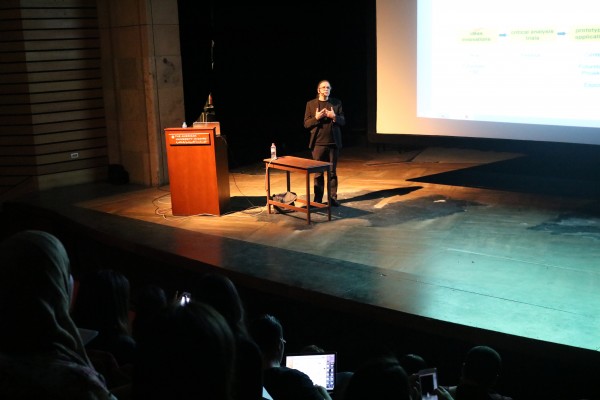ARS Electronica brings the future of Art and Technology to AUC
BY: FARIDA ISMAIL and SARAH GUIRGUIS
@faridaka95 and @SarahSamiGu

The event was hosted by the Department of Journalism and Mass Communication in collaboration with the Department of Arts.
“This is the main thing we’re pursuing – how can we use art as an instrument, as a tool in managing innovations and development,” said Stocker.
The Ars Electronica Institute – based in Linz, Austria – as Stocker explained focuses on how sensitivity, the quality of art and artists could be used to deeply understand the future of technology and its impact on society and culture.
Stocker is a Media Artist and Telecommunications Engineer. Through his presentation, he delved into different sectors other than ARS Electronica.
He explained Mercedes’s innovation of robotic (self driving) cars, showing a clip of the car and how it functions joking about its incompatibility here in Egypt for the excessive traffic.
“Seeing an example of an institution that actually does this is very intriguing to me because I learned a lot about how they work and function,” said Nada Ayoub, integrated marketing & communication and arts senior.
Nadja Al-Zoairy, Deputy director of Austrian Cultural Forum in Cairo, said that these innovative ideas that are products of both art and technology are not so common in Egypt and that’s why they brought him as a guest speaker as a part of a series of lectures that they do each year.
During his lecture, Stocker showed a video about the technology of drones and how far artists and scientists have taken it. He first explained the new technologies being adapted to drones, making them less threatening to people and easier to control.
The video then showcased a documentary about a group of scientists and engineers that managed to fly 100 illuminated drones in the air moving in sync with a live orchestra.
“This kind of art is not even heard of in Egypt. Maybe in 50 years, we’ll start seeing it,” said Nesreen Mamdouh, Arts School graduate.
At the end, Stocker talked about the key to creativity and that curiosity is what opens the mind to innovative and “crazy” ideas that would allow something like the cross section of art and technology to grow.
“Creativity is the raw material of the future but it is a raw material that you constantly have to rebuild. It’s not a value-creation chain where you have something, you take it and you refine it and you sell it and make money,” said Stocker.




